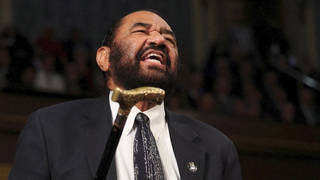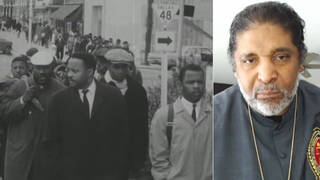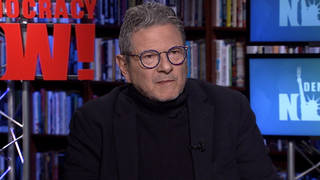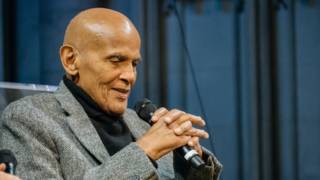
Guests
- Mark Anthony Nealprofessor of black popular culture in the Department of African and African American Studies at Duke University. He is the host of the weekly webcast called Left of Black and he blogs at newblackman.blogspot.com. He is author of several books, including What the Music Said: Black Popular Music and Black Public Culture and Songs in the Keys of Black Life: A Rhythm and Blues Nation.
Links
The music world continues to pay tribute to pop superstar Whitney Houston following her death on Saturday at the age of 48. She was honored at last night’s Grammy Awards by host LL Cool J and Jennifer Hudson. “She is part of a generation of what I called 'black pop crossover artists,' that would include Eddie Murphy, the late Michael Jackson, and even basketball player Michael Jordan, in that they had unprecedented amount of access to the American mainstream,” says Duke University Professor Mark Anthony Neal. “We had never seen that level of black celebrity before… Her success in that mainstream was really unprecedented.” [includes rush transcript]
Transcript
AMY GOODMAN: Music lovers around the world are mourning the death of pop superstar Whitney Houston. She died of unknown causes Saturday in Beverly Hills, California. The singer, actress, model emerged in the '80s as one of her generation's greatest R&B voices with songs such as “Saving All My Love for You,” “How Will I Know” and “The Greatest Love of All.” Whitney Houston’s rendition of “I Will Always Love You” earned record of the year at the 1994 Grammys, with the accompanying The Bodyguard soundtrack taking home best album. In 2009, the Guinness World Records cited Houston as the most-awarded female performer of all time.
Well, yesterday Whitney Houston’s music brought a crowd to its feet once more at the annual celebration of the Grammy Awards in Los Angeles. The host of the 54th annual Grammy Awards, LL Cool J, began by offering a prayer for Whitney Houston.
LL COOL J: And tonight, we ask ourselves, how do we speak to this time, to this day? There is no way around this: we’ve had a death in our family. And so, at least for me, for me, the only thing that feels right is to begin with a prayer for a woman who we loved, for our fallen sister, Whitney Houston. Heavenly Father, we thank you for sharing our sister Whitney with us. Today our thoughts are with her mother, her daughter, and all of her loved ones. And although she is gone too soon, we remain truly blessed to have been touched by her beautiful spirit and to have her lasting legacy of music to cherish and share forever. Amen.
AMY GOODMAN: Later in the Grammy Awards ceremony, singer Jennifer Hudson paid a final tribute to Whitney Houston by singing her own rendition of her song, “I Will Always Love You.” However, Hudson changed the lyrics to “Whitney, we love you.”
JENNIFER HUDSON: [singing] I will always love you
I will always love you
Whitney, we love, we love you.
AMY GOODMAN: Whitney Houston is the latest cultural icon to pass away during this year’s Black History Month. On February 1st, television host Don Cornelius was found dead at his home in Los Angeles in what appeared to be a suicide. Cornelius brought black music and culture into America’s living rooms through his dance show, Soul Train, one of the longest-running syndicated shows in television history, and played a critical role in spreading the music of black America to the world. And late last month, the Grammy Award-winning R&B singer Etta James died at the age of 73 from complications of leukemia. Etta James is regarded as having bridged the gap between rhythm and blues and rock and roll, and is the winner of six Grammys and 17 Blues Music Awards. Neither Don Cornelius nor music icon Etta James were included in last night’s “in memoriam” segment of the Grammy Awards ceremony, although Etta James was honored at the ceremony.
Well, for more on the lives and legacies of these music icons, we’re joined now by Mark Anthony Neal in Madison, Wisconsin. He’s professor of black popular culture in the Department of African and African American Studies at Duke University. He also hosts the weekly webcast called Left of Black and blogs at NewBlackMan.blogspot.com.
Mark Anthony Neal, welcome to Democracy Now! Can you talk about the significance of the death of Whitney Houston?
MARK ANTHONY NEAL: Thank you. First, thank you for having me on this morning, Amy.
The significance of Whitney Houston—you know, she is part of a generation of what I call “black pop crossover artists,” that would include Eddie Murphy, it would include Michael Jackson, the late Michael Jackson, and even basketball player Michael Jordan, in that they had unprecedented amount of access to the American mainstream. We had never seen that level of black celebrity before. There were precursors, obviously, and predecessors to their careers, in terms of what they—in terms of their own musical or even athletic careers, but in terms of the kind of access that a woman like Whitney Houston had to the American mainstream, her success in that mainstream was really unprecedented.
AMY GOODMAN: And talk about what it is that she accomplished in her all-too-short life, I mean, in terms of the kind of music she sang, what she represented, who she influenced in her music.
MARK ANTHONY NEAL: You go back and look at her lineage. You know, included in her family is the great Aretha Franklin, who redefined soul music—in fact, defined soul music in the 1960s, but also Dionne Warwick, you know, who chose much more of a pop—a crossover pop style. What you see in Whitney Houston in the 1980s is really the coming together of two very different streams of black popular music from the 1960s. And she perfected it. I mean, she really found the perfect pitch for what was really pop music. I think, in some ways, we do an injustice to Whitney Houston to even think of her as an R&B singer. She really transcended R&B as it was even in the 1980s. She was, you know, America’s pop princess, and definitely black America’s pop princess.
But when you see the successes of what she did—right? And, of course, there’s a price that she paid for this level of celebrity. We see the same thing with the late Michael Jackson. But to think that in 2012 that LL Cool J, right, coming out of hip hop, you know, 16 years old when he records his first album in 1984, that someone like LL Cool J would be hosting the Grammy Awards, you know, 25 years later, is simply amazing, and it’s a testament to the level of success that someone like Whitney Houston had as a crossover artist in the 1980s.
AMY GOODMAN: Can you give us a brief life history of Whitney Houston—growing up, being born in Newark, New Jersey, the New Hope Baptist Church that was the center of her young life?
MARK ANTHONY NEAL: You know, she’s a working-class girl, working-class, lower-middle-class girl. Her mother, of course, is the legendary vocalist Cissy Houston, who was most well known as a backup singer in the 1960s as a member of the Sweet Inspirations, regularly backed up folks like Aretha Franklin. You know, so she had access to seeing what this music industry was.
In some ways, Whitney Houston’s career is planned and constructed. Once you—you know, they heard that talent, there was no question that they had to find the right vehicle to be able to cross her over. You know, so we start to see her doing things in terms of the fashion industry, you know, when she’s a teenager. They make the connections with Clive Davis. And Clive Davis, of course, is a critical person, right? This is someone who helped manage the careers of folks like Laura Nyro and Miles Davis and Carlos Santana in the 1960s. You know, he’s at the centerpiece of creating what we know as a boutique model of black music recording, starting with Philadelphia International Records with Leon Huff and Kenneth Gamble in 1972 and going forward to folks like Babyface and L.A. Reid and LaFace Records, which of course worked with Whitney Houston, you know, at some point in her career. So she was perfectly set up to have this kind of crossover appeal. They made sure, to establish her, that they would connect her with R&B artists. So she worked with Jermaine Jackson. She worked with the producer Kashif. And they find a way to introduce her to black radio, but also with this eye on that she would have this incredible, you know, success as kind of a crossover artist. And of course she achieves that. You know, when you think about the number of kids who were my age in the 1980s, you know, late teens and early twenties, who all talked about, regardless of race, how Whitney Houston was their first crush, it speaks to how successfully she made that transition.
And then, of course, she went into acting. You know, folks forget how really great she was in films like Bodyguard and Waiting to Exhale and The Preacher’s Wife and really had established herself as a multimedia presence in terms of American mainstream culture.
AMY GOODMAN: And then, talk about her marrying Bobby Brown, the turmoil in her life, the terrible problems she had with drugs and alcohol.
MARK ANTHONY NEAL: You know, there is enough evidence to suggest that, you know, her marriage to Bobby Brown was not her first introduction to drugs. I mean, we’re talking about American celebrity culture, so, you know, this stuff is not unusual. You know, one of the interesting things about Whitney Houston’s trajectory is that, at some point in the late 1980s, again, in some ways, she’s a groundbreaker, in terms of being able to achieve this mainstream success, and she had to deal with criticisms coming from black folks, from her black audience, that in fact she had crossed over too much, that there was, you know, this feeling that there was a lack of authenticity in who Whitney Houston was. And many folks often read her marriage to Bobby Brown as an attempt, you know, to reclaim a ghetto past, if you will, you know, that it was to give her some sense—a street sheen that, of course, Bobby Brown had at the time. Clearly there was a connection with them, because they wouldn’t have stayed together so long, no matter how tumultuous their marriage was. They clearly loved each other. You know, the product of that, of course, is their daughter, Bobbi Kristina.
And I think, you know, Bobby Brown, in some ways, is an easy target here to suggest that, you know, her marriage to Bobby Brown leads to her, you know, falling down, in terms of the way that we saw her as America’s pop princess. You know, folks forget at the time that they got married, Bobby Brown was also at the peak of his career. You know, there are many folks who looked at him for resuscitating what we knew as R&B music in the late 1980s via his productions with Teddy Riley and so-called, you know, new jack swing. You know, so both of them paid a price, I think, for their addictions.
AMY GOODMAN: And we’re going to break and come back and talk about Don Cornelius and Etta James. We’re speaking with Mark Anthony Neal, professor of black popular culture at the Department of African and African American Studies at Duke University. This is Democracy Now! Back in a minute.
[break]
AMY GOODMAN: That was Whitney Houston singing “I Have Nothing” during a concert in South Africa. In October 1994, she attended and performed at a state dinner at the White House honoring newly elected president of South Africa, Nelson Mandela. And at the end of her world tour, she performed three concerts in South Africa to honor President Mandela, playing to over 200,000 people.
And we’re joined by Professor Mark Anthony Neal, who teaches black popular culture in the African and African American Studies Department at Duke University. Do you remember this journey that she took to South Africa?
MARK ANTHONY NEAL: Yes, I did. It was, you know, extraordinary news. It spoke to her—really her image as a global icon. And so, it made absolute sense that she would be there to celebrate the presidency of Nelson Mandela. I mean, in some ways, when you think about that era and some of the great stories and the great icons, you know, it’s hard not to think about Whitney Houston along with someone like Nelson Mandela in that regard.
AMY GOODMAN: At the White House, at the dinner where she performed honoring Nelson Mandela, she said, “This performance is very special to me because in 1988 I sang in honor of Nelson Mandela, the inmate, and tonight I sing for elected president Nelson Mandela.”
MARK ANTHONY NEAL: Absolutely.












Media Options